At the end of this week, participants of the World Solving Cup (WSC) will have to choose between two competitions happening at the same time, the open championships of the Netherlands and Poland. What should they know to make the right choice?
The Dutch Solving Championship (March 4) is shorter and usually less challenging than the Polish one. It is a central part of a large festival, the annual meeting of Dutch chess problemists, traditionally held in the small town of Nunspeet (March 3-5).
Solvers, composers and lovers of chess problems and studies come together in a friendly but competitive environment. The program includes lectures, solving tournaments and composing tourneys. A quiz keeps the participants busy in the quiet hours, and there are plenty of occasions for walking, swimming and making an excursion. It is not obligatory to stay the entire weekend, and the interested club player can come over for a few hours to try his hand at one of the tournaments.
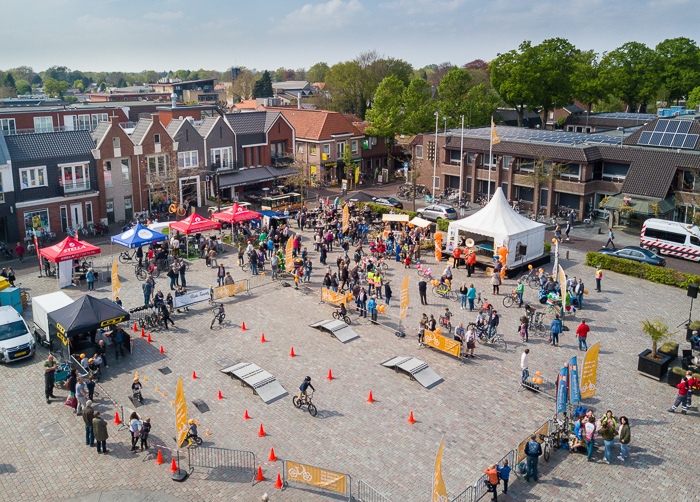 Photo: https://www.nunspeet.nl/
Photo: https://www.nunspeet.nl/
Saturday morning is reserved for the Dutch Solving Championship: 3 hours for solving 12 problems, with some of the best solvers in the world participating. National championships are open for all the guests nowadays, most of them being the legs of the World Solving Cup, but the domestic title holders are distinguished separately.
The Dutch record holder is Dolf Wissmann with 14 domestic titles (nine of them in a row!) in 27 championships since 1995, ahead of Peter van den Heuvel with 8, but the last two championships were won by Twan Burg. Dolf is coming back home fresh from winning the Finnish Solving Championship in Helsinki last month and will be looking to earn more points in the overall standings of WSC 2022/23.
There is also a section with easier problems for an occasional solver. More relaxed is the speed of solving (two-movers and studies) on Saturday evening. The weekend finishes on Sunday morning with the ARVES study-solving tournament: 6 studies in 2 hours. The winner must be accurate and fast because these endgames are not extremely difficult.
Many GMs have tested themselves in this competition, and some past winners include GMs John Nunn, Twan Burg and David Klein. However, in 2019 ARVES competition WGM Anne Haast (pictured below) outdid all the men.
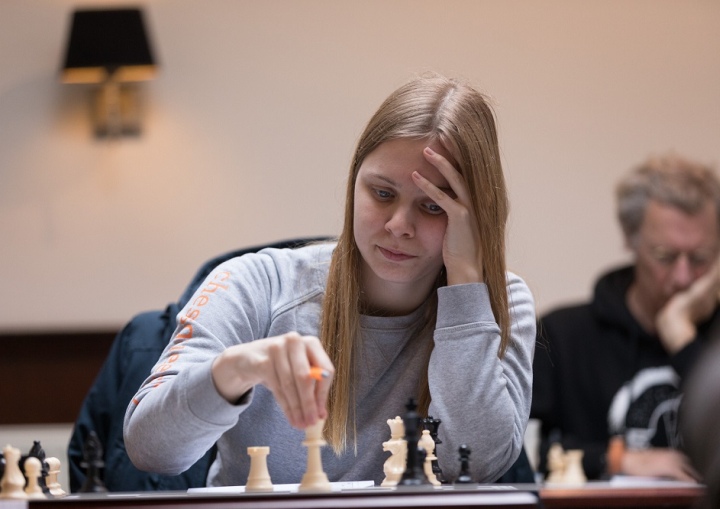 Photo: ChessBase/Harry Gielen
Photo: ChessBase/Harry Gielen
All details about the tournaments and the complete program can be found on the websites of Probleemblad (Nederlandse Bond van Schaakprobleemvrienden) and ARVES (Chess Endgamestudy Association).
The atmosphere will be less relaxed in Sękocin Stary (near Warsaw), where Polish solvers challenge guests to compete with multiple World & European solving champions. The International Polish Championship will take place from March 4-5, with three rounds each day and a total time of 6 hours for 18 problems. The strong field of this two-day event includes members of the Polish national team and the current world chess-solving champions (pictured on the stage of the Fujairah WCSC 2022).
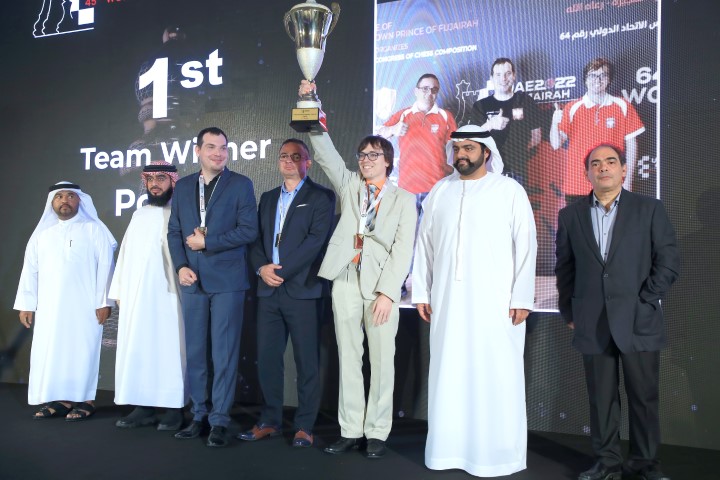 Polish team, the reigning World Champions: Kacper Piorun, Piotr Murdzia and Piotr Gorski | Photo Fujairah Chess & Culture Club
Polish team, the reigning World Champions: Kacper Piorun, Piotr Murdzia and Piotr Gorski | Photo Fujairah Chess & Culture Club
The problems in Poland are usually more difficult than average. Below you will find two selected positions from the previous championship:
1
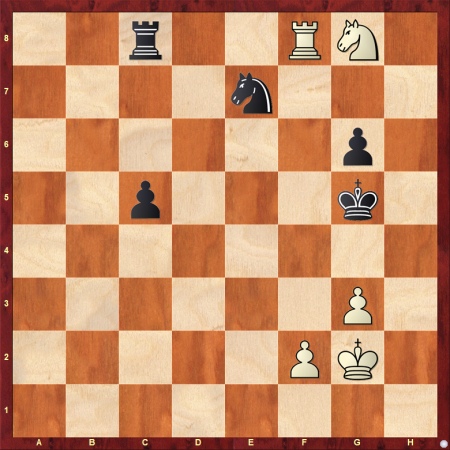 White to play and win (end of study)
White to play and win (end of study)
HINT: Can White take advantage of the black king’s position?
2
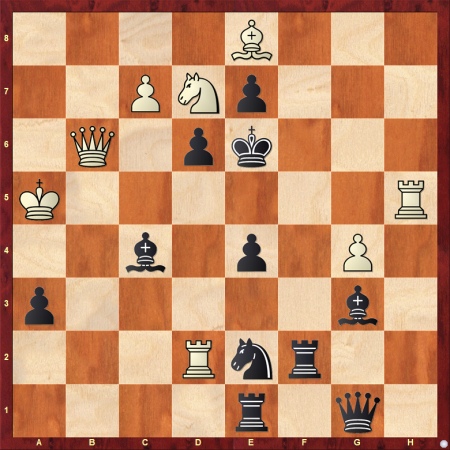 White to play and mate in 3 moves
White to play and mate in 3 moves
HINT: The hardest nut to crack. The first thing to do in three-movers is to find possible checks Black can do on the 1st or 2nd move, which may delay or make White’s goal impossible. Here, Black has such options. It is not 1…Rf5+, because a mate in one follows: 2. gxf5#. However, there is a serious threat of Rb1-b5+. This is why the White key move should contain a threat with check; e.g we can try 1. Rdd5 with the check threat of 2.Rde5+ Bxe5 3.Rxe5#. This is refuted by 1… Bxd5. Can you find the correct answer?
Poland is the most successful country in chess solving. In the years 2009-2022, the Polish team won 12 World and 5 European gold medals! Among the participants, you may meet the defending champion of Poland Piotr Murdzia, a holder of 22 national titles and eight individual World Champion titles. There will also be the five-time World Champion Kacper Piorun and Piotr Górski, who won this most prestigious title once. It will be highly challenging for any guest to win on Polish soil, but the high average rating and the high WSC category of the competition will offer a chance to earn more points for the World Solving Cup!
The Polish championship is completely adjusted to the system of the World Chess Solving Championship (WCSC) and has the utmost importance in selecting the members of the national team in the upcoming European Chess Solving Championship 2023 and World Chess Solving Championship 2023. It also determines national winners in the following categories: open, women, juniors up to 23 years and seniors over 60.
Solutions:
1. Nielsen, Minski, original for Polish Championship 2022; end of the study: 1.f4+ Kg4 2.Rf5!! +- (1…Kh5 2.Kh3! g5 3.g4+ +-)
2 W. Tura, De Waarheid 1962: 1.Qe3 threat 2.Qh6+ Rf6 3.Nf8#; 1…Bf4 2.Rh6+ B:h6 3.Q:e4#; 1…Rf4 2.Q:e4+ R:e4 3.Rh6#; 1…Nf4 2.Re5+ d:e5 3.Qb6#; 1…Rf6 2.Nc5+ d:c5 3.c8Q(B)#; 1…d5 2.Qb6+ Bd6 3.Re5#
Official website: wfcc.ch/

